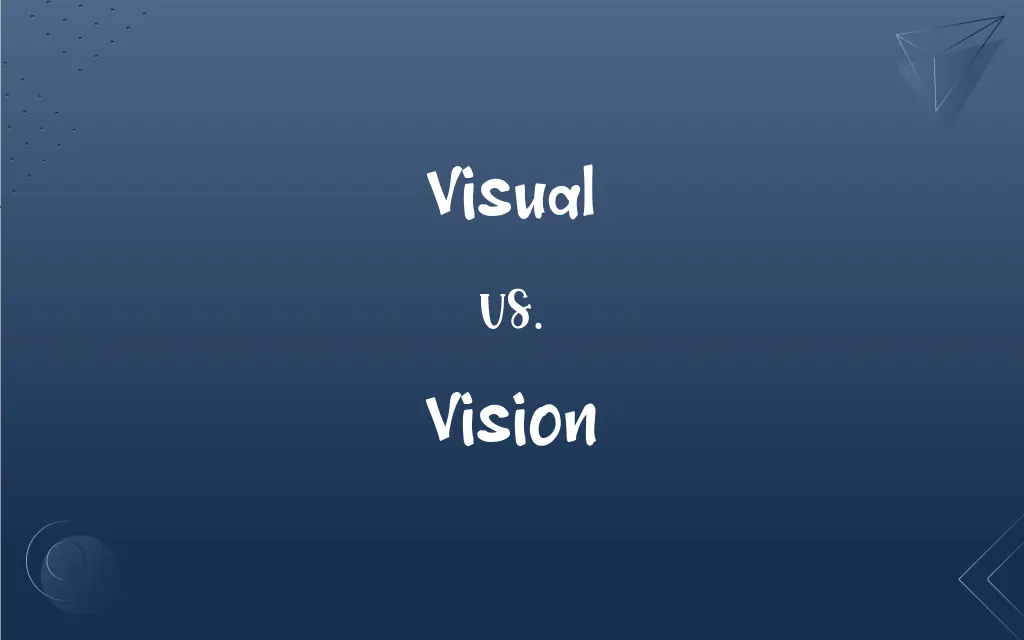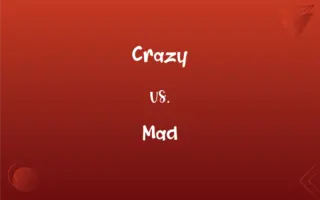Visual vs. Vision: What's the Difference?
Edited by Harlon Moss || By Janet White || Updated on October 4, 2023
Visual pertains to sight or things seen, often used as an adjective; Vision refers to the ability to see or to imagine future possibilities. Each word speaks to different aspects of sight and imagination.

Key Differences
Visual as a term primarily refers to things that are seen or related to sight. It pertains to images, graphics, or anything perceivable by the eyes. Vision, on the other hand, encompasses the ability of the eyes to perceive these visuals. While visual presents an immediate representation, vision leans towards the function that enables such perception. Visuals are tangible, apparent, and can be directly related to the sense of sight.
In another vein, visual is predominantly utilized as an adjective. For instance, one might discuss visual arts, visual effects, or visual perception, indicating a primary involvement of sight or appearance in these contexts. Vision tends to navigate towards the realm of the intangible when not directly referencing sight. It embodies the capacity to foresee, conceptualize, or imagine things that aren't immediately perceptible.
Visual aids, for example, are tangible entities used to facilitate understanding or communication through sight, be they diagrams, films, or charts. These aids serve a straightforward purpose — to be seen and interpreted. Vision, meanwhile, might involve a leader’s capacity to conceptualize a future plan or an individual's aspiration or foresight, highlighting the abstract or future-oriented implication of the term.
When someone speaks of visual impairment, they’re addressing a deficiency in the literal sense of sight, perhaps due to ocular health or perceptual issues. Vision impairment, while similarly related to sight deficiency, might also metaphorically apply to lack of foresight or inability to conceive future scenarios, though the latter application is considerably more colloquial and metaphorical.
Artistically, visual realms are occupied by painters, graphic designers, and cinematographers, where the creation is meant for ocular consumption. Vision in an artistic context might refer to an artist’s conceptual understanding or innovative foresight, pointing toward their ability to imagine and bring forth creations from abstract concepts. Thus, while visuals are objects of sight, vision can also allude to a metaphorical or future-oriented sight.
ADVERTISEMENT
Comparison Chart
Part of Speech
Mainly used as an adjective
Mainly used as a noun
Tangibility
Pertains to tangible images
Can refer to intangible concepts
Usage
Commonly literal
Can be metaphorical
Context
Primarily sensory
May involve foresight/planning
Related Terms
Visual aids, visual arts
Visionary, visionary leader
ADVERTISEMENT
Visual and Vision Definitions
Visual
Pertaining to visual art
He is a student in the visual arts program.
Vision
A mental image or dream
He had a vision of a peaceful world.
Visual
Related to sight
The visual elements of the movie were stunning.
Vision
Imaginative foresight
The CEO’s vision brought the company success.
Visual
Used for seeing
Visual apparatus like telescopes help us see faraway objects.
Vision
The faculty of sight; eyesight
Poor vision.
Visual
Of or relating to the sense of sight
A visual organ.
Visual receptors on the retina.
Vision
Something that is or has been seen.
Visual
Seen or able to be seen by the eye; visible
A visual presentation.
A design with a dramatic visual effect.
Vision
Unusual competence in discernment or perception; intelligent foresight
A leader of vision.
Visual
Optical.
Vision
The manner in which one sees or conceives of something.
Visual
Done, maintained, or executed by sight only
Visual navigation.
Vision
A mental image produced by the imagination.
Visual
Having the nature of or producing an image in the mind
A visual memory of the scene.
Vision
The mystical experience of seeing something that is not in fact present to the eye or is supernatural.
Visual
Of or relating to a method of instruction involving sight.
Vision
A person or thing of extraordinary beauty.
Visual
A picture, chart, or other presentation that appeals to the sense of sight, used in promotion or for illustration or narration
An ad campaign with striking visuals.
Trying to capture a poem in a cinematic visual.
Vision
To see in a vision.
Visual
Related to or affecting the vision.
Vision
To picture in the mind; envision.
Visual
(obsolete) That can be seen; visible.
Vision
(uncountable) The sense or ability of sight.
Visual
Any element of something that depends on sight.
Vision
(countable) Something seen; an object perceived visually.
Visual
An image; a picture; a graphic.
Vision
(countable) Something imaginary one thinks one sees.
He tried drinking from the pool of water, but realized it was only a vision.
Visual
(in the plural) All the visual elements of a multimedia presentation or entertainment, usually in contrast with normal text or audio.
Vision
Something unreal or imaginary; a creation of fancy.
Visual
(advertising) A preliminary sketch.
Vision
(countable) An ideal or a goal toward which one aspires.
He worked tirelessly toward his vision of world peace.
Visual
Of or pertaining to sight; used in sight; serving as the instrument of seeing; as, the visual nerve.
The air,Nowhere so clear, sharpened his visual ray.
Vision
(countable) A religious or mystical experience of a supernatural appearance.
He had a vision of the Virgin Mary.
Visual
That can be seen; visible.
Vision
(countable) A person or thing of extraordinary beauty.
Visual
Relating to or using sight;
Ocular inspection
An optical illusion
Visual powers
Visual navigation
Vision
(uncountable) Pre-recorded film or tape; footage.
Visual
Able to be seen;
Be sure of it; give me the ocular proof
A visual presentation
A visual image
Vision
(transitive) To imagine something as if it were to be true.
Visual
Aids for comprehension
She used visuals to enhance her presentation.
Vision
(transitive) To present as in a vision.
Visual
Involving optical appearances
The play had striking visual effects.
Vision
(transitive) To provide with a vision. en
Vision
The act of seeing external objects; actual sight.
Faith here is turned into vision there.
Vision
The faculty of seeing; sight; one of the five senses, by which colors and the physical qualities of external objects are appreciated as a result of the stimulating action of light on the sensitive retina, an expansion of the optic nerve.
Vision
That which is seen; an object of sight.
Vision
Especially, that which is seen otherwise than by the ordinary sight, or the rational eye; a supernatural, prophetic, or imaginary sight; an apparition; a phantom; a specter; as, the visions of Isaiah.
The baseless fabric of this vision.
No dreams, but visions strange.
Vision
Hence, something unreal or imaginary; a creation of fancy.
Vision
To see in a vision; to dream.
For them no visioned terrors daunt,Their nights no fancied specters haunt.
Vision
A vivid mental image;
He had a vision of his own death
Vision
The ability to see; the faculty of vision
Vision
The perceptual experience of seeing;
The runners emerged from the trees into his clear vision
He had a visual sensation of intense light
Vision
The formation of a mental image of something that is not perceived as real and is not present to the senses;
Popular imagination created a world of demons
Imagination reveals what the world could be
Vision
A religious or mystical experience of a supernatural appearance;
He had a vision of the Virgin Mary
Vision
The faculty of sight
Her vision is impaired without glasses.
Vision
A supernatural experience
The prophet had a vision of the future.
Vision
An ideal or goal
His vision for the community involves inclusivity.
FAQs
Can "visual" refer to any sensory experience?
No, "visual" specifically pertains to experiences related to sight.
Is a painting considered a "visual"?
Yes, a painting can be considered a visual as it’s an object related to sight.
What is a "visual aid"?
A "visual aid" is something designed to be seen, used to help explain or illustrate information, like charts or images.
Can "vision" be used in a metaphorical sense?
Yes, "vision" can refer to foreseeing, planning, or imagining future events.
Can both "visual" and "vision" refer to something related to sight?
Yes, "visual" pertains to sight, and "vision" can relate to the faculty of seeing or conceptualizing future events.
Is "visual" a noun or an adjective?
"Visual" can be both a noun and an adjective.
Can "visual" refer to a person?
Typically, no. "Visual" usually refers to things or experiences related to sight.
Can "vision" refer to a literal visual experience?
Yes, "vision" can refer to the faculty of seeing or a perceptual experience.
Can a person be described as a "visual"?
Typically no, "visual" describes things related to sight, not people.
Can "vision" only be used to describe actual sighted experiences?
No, "vision" can also refer to metaphorical or future-oriented seeing.
What does "have a vision" mean?
"Have a vision" means to have a clear idea about what should happen or be done in the future.
Is "vision" used in medical contexts?
Yes, "vision" can relate to one’s ability to see and is used in medical contexts to discuss eyesight.
How are "visual" and "vision" used in technological contexts?
"Visual" may refer to graphical elements on a screen, while "vision" might refer to a company’s forward-looking plan or a technology related to sight.
Is "vision" always related to eyesight?
No, "vision" can also relate to the ability to think about or plan the future with imagination or wisdom.
Are "visual" and "vision" interchangeable?
No, they are used differently. "Visual" typically relates to seeing, and "vision" may also include future conceptualization.
Is "vision" only used in a positive context?
No, "vision" can be neutral and doesn’t inherently carry a positive or negative connotation.
Can "visual" ever refer to planning for the future?
No, "visual" typically doesn’t have the forward-looking connotation that "vision" can have.
Are "visual" and "vision" used in everyday language?
Yes, both words are commonly used but in different contexts – "visual" often in relation to tangible sight-related elements and "vision" potentially in leadership or planning contexts.
Can both "visual" and "vision" be used in artistic contexts?
Yes, "visual" might refer to actual artistic works, and "vision" might refer to an artist’s conceptual foresight.
Do "visual" and "vision" have similar etymological origins?
Yes, both originate from Latin words related to seeing ("visus" and "videre").
About Author
Written by
Janet WhiteJanet White has been an esteemed writer and blogger for Difference Wiki. Holding a Master's degree in Science and Medical Journalism from the prestigious Boston University, she has consistently demonstrated her expertise and passion for her field. When she's not immersed in her work, Janet relishes her time exercising, delving into a good book, and cherishing moments with friends and family.
Edited by
Harlon MossHarlon is a seasoned quality moderator and accomplished content writer for Difference Wiki. An alumnus of the prestigious University of California, he earned his degree in Computer Science. Leveraging his academic background, Harlon brings a meticulous and informed perspective to his work, ensuring content accuracy and excellence.































































